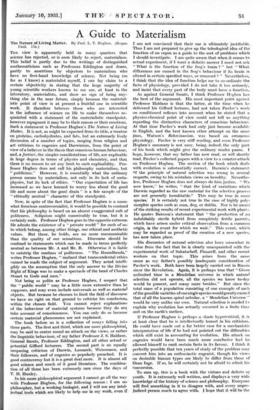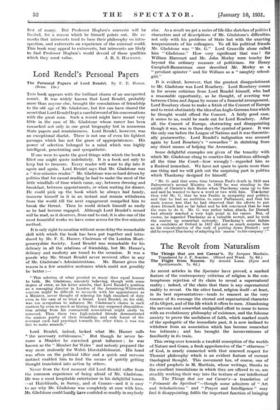A Guide to Materialism The Nature of Living Matter. By
Prof. L. T. Hogben. (Kogan Paul. 15s.) THE view is apparently held in many quarters that science has rejected, or is soon. likely to. reject, materialism. This belief is partly due to the writings of distinguished mathematicians such as Professors Eddington and Jeans, partly to assertions by objectors to materialism who have no first-hand knowledge of science. Not being (so far as I know) a materialist myself, I can lay claim to a certain objectivity in stating that the large majority of young scientific workers known to me are, at least in the laboratory, materialists, and show no sign of being any- thing else in the near future, simply because the material- istic point of view is at present a fruitful one in scientific work. It therefore behoves those who are interested in the influence of science on life to make themselves ac- quainted with a statement of the materialistic standpoint, however repugnant it may be to their reason or their emotions. Such a statement is Professor. Hogben's The Nature of Living Matter. It is not, as might be expected from its title, a treatise on proteins, carbohydrates, and fats, but an extremely lively discussion of a number of topics, ranging from religion and art criticism to eugenics and Darwinism, from the point of view of a believer in the thesis that conscious human behaviour, and, a fortiori, the simpler manifestations of life, are explicable in large degree in terms of physics and chemistry, and that there is no reason to set any limit to such explicability. Pro- fessor Hogben does not call his philosophy materialism, but " publicism." However, it is essentially what the ordinary person means by materialism, not only in its lack of meta- physics, but its lack of ethics. " Our expectation of life has increased as we have learned to worry less about the good life and more about the good drain " is a fair sample of the " ethically neutral " character of this standpoint.
Now, in spite of the fact that Professor Hogben is a some- what ferocious controversialist, it would be possible to contend that his philosophy is based on an almost exaggerated cult of pOliteness. Solipsism might conceivably be true, but it is certainly. rude. Professor Hogben goes to the opposite extreme. He admits the existence of a " private world " for each orus, to which belong, among other things, our ethical and aesthetic values. But these, he holds, are no more communicable than the quality of our sensations. Discourse should be confined to statements which can be made in terms perfectly neutral as between Mr. A and Mr. B. Otherwise it is liable to outstrip the confines of politeness. " The Roundheads," writes Professor Hogben, " realized that- transcendental ethics cannot be made the subject of argument. They acted intelli- gibly on the assumption that the only answer to the Divine Right of Kings was to make a spectacle of the head of Charles Stuart to Gods and men."
Not being so polite as Professor Hogben, I suspect that the " public world " may be a little more extensive than he supposes, and may even include universals as well as material objects. But because he chooses to limit the field of discourse we have no right on that ground to criticize his conclusions within the chosen field. You cannot reject explanations of the behaviour of material systems because they do not take account of consciousness. You can only do so because certain material phenomena are not explained.
The book before us is a collection of essays falling into three parts. The first and third, which are more philosophical, may be said to centre round an attack on the views, or rather the linguistic behaviour, of my father Professor J. S. Haldane, General Smuts, Professor Eddington, and all other actual or potential Gifford lecturers. The second part is an equally unsparing criticism of Darwin, Lamarck, Weissmann, and their followers, and of eugenics as popularly preached. It is good controversy but it is a great deal more. It is almost all good science and much of it good literature. The combina- tion of all three has been extremely rare since the days of T. H. Huxley. In his more philosophical argument I cannot go all the way with Professor Hogben, for the following reason : I am no philosopher, but a working• biologist, and I will use any intel- lectual tools which are likely to help me in my work, even if
I am not convinced that their use is ultimately justifiable. Thus I am not prepared to give up the teleological idea of the function of an organ as a guide to the sort of problems which I should investigate. I am quite aware that when it comes to actual experiment, if I want a definite answer I must not ask " What is the function of the frog's brain ? " but " What differences are caused in the frog's behaviour if its brain is altered in certain specified ways, or removed ? " Nevertheless, I think that the idea of function helps me to co-ordinate the facts of physiology, provided I do not take it too seriously, and insist that every part of the body must have a function. As against General Smuts, I think Professor Hogben has the best of the argument. His most important point against Professor Haldane is that the latter, at the time when he delivered his Gifford lectures, had not taken Pavlov's work on conditioned reflexes into account when he stated that a physico-chemical point of view could not tell us anything regarding the distinctive characters of conscious behaviour. At that time Pavlov's work had only just become available in English, and the best known other attempt on the same lines, Watson's Behaviourism, was based on erroneous physiology. Pavlov is very stiff reading, and even Professor Hogben's summary is not easy, being, indeed, the only part of his book which might give the ordinary reader pause. I hope, however, that my father has now read, or will shortly read, Pavlov's collected papers with a view to a counter-attack on Professor Hogben. The section of the book which deals with evolution is substantially correct. Darwin's statement of the principle of natural selection was wrong in several respects, owing to his mistaken views on heredity. Neverthe- less, Professor Hogben does not always do him justice. " We now know," he writes, " that the kind of variations which Darwin regarded as the raw material for the selective process are not generally hereditable." This may be true in some species: It is certainly not true in the case of highly poly- morphic species such as man, dog, or dahlia. Nor is he aware of the striking results of recent experimental work with plants. He quotes Bateson's statement that " the production of an indubitably sterile hybrid from completely fertile parents, which have arisen under critical observation from a common origin, is the event for which we wait." This event, which may be regarded as proof of the creation of a new species, has now taken place.
His discussion of natural selection also loses somewhat in value from the fact that he is clearly unacquainted with the experimental work of Sukatscheff, Pissareff, and other recent workers on that topic. This arises from the same cause as my father's possibly inadequate consideration of Pavlov's work. Both have been largely carried out in Russia since the Revolution. Again, it is perhaps true that "Given unlimited time in a Mendelian universe in which natural selection did not operate, all the species we know to-day would be present, and many more besides." But since the total mass of a population consisting of one example of each of the possible varieties of one single species would greatly exceed that of all the known spiral nebulae, a Mendelian Universe " would be very unlike our own. Natural selection is needed to explain why evolution has actually occurred in a finite time and on the earth's surface.
If Professor Hogben is perhaps a shade hypercritical, it is at least clear that he is intellectually honest in his criticism. He could have made out a far better case for a mechanistic interpretation of life if he had not pointed out the difficulties which still exist in accounting for evolution. His attack on eugenics would have been much more conclusive had he allowed himself to omit certain facts in its favour. I think it perfectly possible that ten years of study of the problem may convert him into an enthusiastic eugenist, though his views on desirable human types are likely to differ from those of Dean Inge. If so, he will certainly not be afraid to admit his conversion.
To sum up, this is a book with the virtues and defects o t youth. It is extremely well written, and displays a very wide knowledge of the history of science and philosophy. Everyone will find something in it to disagree with, and every unpre- judiced person much to agree with. I hope that it will be the
first of many. But Professor Hogben's converts will be limited, for a reason which he himself points out. He re- marks that introverts tend to base their philosophy on intro- spection, and extroverts on experience of the external world. This book may appeal to extroverts, but introverts are likely to find Professor Hogben's world devoid of those qualities



































 Previous page
Previous page